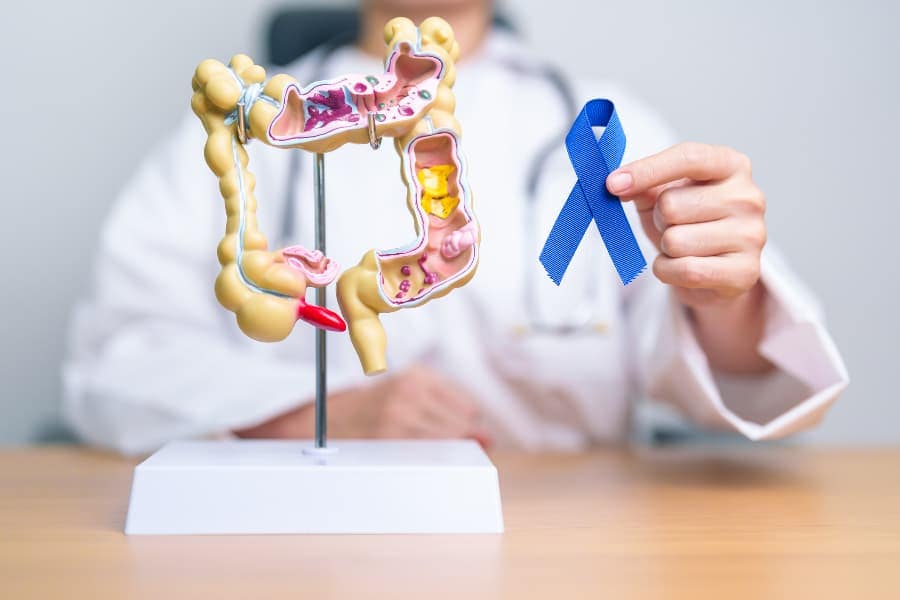When it comes to cancer treatment, early detection is essential. The sooner cancer is diagnosed, the more effective treatment can be, leading to a more positive outcome. This is why patient education is crucial. By understanding the symptoms and risk factors, people can make informed decisions about when to seek screening. Here, the Oncology Department at Richmond University Medical Center discusses colorectal cancer symptoms, screening, and risk factors to empower Staten Island patients.
The Importance of Early Detection
Colorectal cancer is the third most common cancer type in the United States. According to estimates by American Cancer Society, over 107,000 new cases of colon cancer and nearly 47,000 new cases of rectal cancer will be diagnosed in 2025. These numbers are exceeded only by skin cancer in all populations, breast cancer in women, and prostate cancer in men.
Early detection is key when treating any type of cancer. Early-stage colorectal cancer has a survival rate of over 90%. In later stages, however, when cancer cells have metastasized (spread) throughout the body, it makes the disease more difficult to treat. The sooner cancer is diagnosed, the lower the likelihood of metastasis – and the more effective treatments will be.
What Are Colorectal Cancer Symptoms?
Because colorectal cancer spreads quickly, patients should pursue treatment as soon as they notice something wrong. Symptoms of colorectal cancer include:
- Unexplained weight loss
- Rectal bleeding or blood in stool
- Intestinal gas or bloating
- Abdominal cramps
- Chronic constipation or diarrhea
- Narrow, pencil-like stools
- Constant feelings of fullness in the bowels
- Weakness and fatigue
Early stages of colorectal cancer, however, are often asymptomatic, in other words, no symptoms at all. Noticeable problems may not develop until the cancer becomes more advanced. For this reason, symptoms-based diagnosis is not reliable. Colorectal cancer screening is essential to detect cancer as early as possible.
What Is Colorectal Cancer Screening?
Cancer screening is a key part of early detection. Through routine testing, oncologists can identify signs of cancer before it starts showing any symptoms. This gives patients and physicians an excellent chance of detecting cancer in its earliest stages.
Traditionally, physicians recommended that routine screening begin at age 50. In recent years, however, the average age of colorectal cancer diagnosis has been declining. The recommended age for screening has been reduced to forty-five to catch cancer developing in younger patients:
- Stool testing: These tests evaluate the stool for blood, DNA fragments, and other cancer indicators. They can be performed with at-home tests every one to two years. If results come back positive, patients should follow up with a colonoscopy.
- Colonoscopy: This endoscopic procedure uses a specialized camera to examine the inside of the colon and to remove pre-cancerous growths. If colonoscopies come back negative for cancer and pre-cancer, they only need to be repeated every ten years. Colonoscopy is the “golden standard” for colorectal cancer screening.
These guidelines apply to patients at average risk of colorectal cancer. For patients with a higher-than-average risk, earlier or more frequent screening may be recommended. These patients should be aware of their risk factors and speak with a physician about a personalized screening plan.
What Are the Colorectal Cancer Risk Factors?
Colorectal cancer may affect anyone. Certain people, however, are more likely than others to develop the disease. Some of these are under the patient’s control, while others are unavoidable. Either way, people should be aware of which factors apply to them. Major risk factors include:
- Gender: Men are slightly more likely to develop colorectal cancer than women.
- Racial background: African American individuals are more likely to develop cancer than people of other racial backgrounds.
- Age: Most colorectal cancer diagnoses occurs after age 45.
- Diet: A diet rich in fat, red meats, and processed foods and low in fresh fruits and vegetables can increase colorectal cancer risk.
- Alcohol: Moderate to heavy alcohol use has been connected to colorectal cancer occurrence.
- Smoking: Long-term or heavy smoking increases a person’s risk for several types of cancer.
- Weight: People who are overweight or have obesity are at higher risk of colorectal cancer.
- Activity: People who have a sedentary lifestyle and exercise infrequently may also be at higher risk of colorectal cancer.
- Medical history: A history of inflammatory bowel disease, such as ulcerative colitis or Crohn’s disease, can create cell changes that may lead to cancer.
- Family history: If a person has a first-degree relative with colorectal cancer, such as a parent or sibling, then the person may be at higher risk of cancer.
When patients understand their risk factors, they are empowered to make informed decisions about colorectal cancer screening.
Learn More About Colorectal Cancer at Richmond University Medical Center
By understanding key information about colorectal cancer, you can get involved in your care. Learn more about this common cancer at Richmond University Medical Center. We provide patient education, colorectal cancer screenings, and a variety of treatment options at our hospital and Center for Cancer Care in Staten Island, New York. Contact us to learn more about our services or to schedule a consultation.




